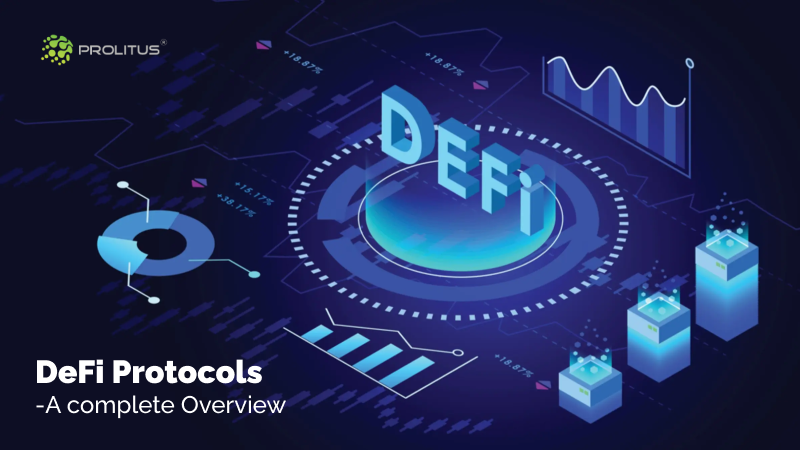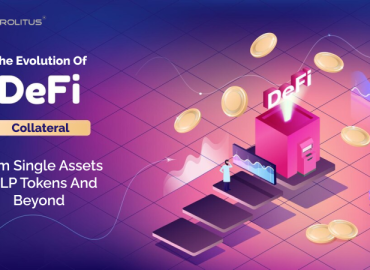Decentralized Finance (DeFi) is a rapidly growing ecosystem that leverages blockchain technology to offer decentralized, trustless, and open financial services. DeFi aims to provide financial access to anyone with an internet connection without the need for intermediaries such as banks or other financial institutions.
The purpose of DeFi is to create an alternative financial system that is more accessible, transparent, and secure than the traditional financial system. It allows individuals to interact directly with each other to exchange, lend, and borrow assets while also offering the benefits of automated and secure financial services.
The benefits of DeFi include the following:
Accessibility: DeFi enables anyone with an internet connection to participate in the financial system, regardless of their location or credit history.
Transparency: DeFi protocols are built on blockchain technology, which provides a transparent and auditable ledger of all transactions.
Security: DeFi protocols use smart contracts, cryptographic algorithms, and decentralized infrastructure to secure users’ assets.
Interoperability: DeFi protocols are open-source and can be easily integrated with other protocols, enabling users to access a wide range of financial services within a single platform.
Decentralization: DeFi eliminates the need for intermediaries, reducing the risk of censorship, fraud, or manipulation.
DeFi has the potential to revolutionize the financial system by providing more accessible, transparent, and secure financial services to individuals around the world.
Innovation: DeFi provides a platform for developing and implementing new and innovative financial services and products. This allows for faster and more efficient financial innovation than traditional financial systems.
Yield Generation: DeFi protocols allow individuals to earn a yield on their assets through various means, such as staking, liquidity provision, and lending. This can result in higher returns compared to traditional savings and investment options.
Community-Driven: DeFi is a community-driven ecosystem, with users and developers actively contributing to the development and growth of the platform. This results in a more collaborative and inclusive financial system.
Borderless: DeFi operates globally, enabling individuals to participate in the financial system regardless of location. This results in a more inclusive financial system and greater individual financial freedom.
Censorship-Resistant: DeFi operates on decentralized infrastructure, making it resistant to censorship and control by governments or other centralized entities. This results in a more democratic and open financial system.
Lower Barriers to Entry: DeFi protocols have lower barriers to entry compared to traditional financial services, allowing more individuals to participate in the financial system. This results in a more inclusive and accessible financial system for all.
Understanding DeFi Protocols: What are DeFi protocols and their significance in the DeFi ecosystem.
DeFi protocols are decentralized, open-source platforms that provide financial services in a trustless and transparent manner. These protocols are built on blockchain technology and run on decentralized infrastructure, eliminating the need for intermediaries such as banks or other financial institutions.
DeFi protocols provide various financial services, including lending and borrowing, yield generation, trading, and more. These services are facilitated by smart contracts that automate the transfer of assets based on predefined rules.
The significance of DeFi protocols in the DeFi ecosystem lies in their ability to provide financial services in a more accessible, transparent, and secure manner compared to traditional financial services. DeFi protocols enable individuals to interact directly with each other to exchange, lend, and borrow assets without the need for intermediaries. This results in a more inclusive and democratic financial system where individuals have greater control over their financial assets.
DeFi protocols also provide a platform for innovation and experimentation in the financial sector, enabling the development and implementation of new and innovative financial products and services. This has the potential to disrupt traditional financial systems and create a more efficient and accessible financial system for all.
Furthermore, DeFi protocols allow for greater accessibility to financial services for individuals previously excluded from traditional financial systems. This includes individuals from underbanked and unbanked communities, who can now participate in the financial system through DeFi protocols.
Additionally, DeFi protocols offer users the opportunity to earn a yield on their assets through various means, such as staking, liquidity provision, and lending. This provides a new avenue for individuals to grow their wealth and achieve financial stability.
Another essential aspect of DeFi protocols is their potential to promote financial inclusion and democratization. By eliminating intermediaries and providing a more transparent and secure financial system, DeFi protocols have the potential to level the playing field and provide equal opportunities for all to participate in the financial system.
DeFi protocols also offer greater transparency and security compared to traditional financial systems. All transactions and activities on DeFi protocols are recorded on a public ledger, providing a transparent and auditable record of all transactions. Additionally, DeFi protocols use cryptographic algorithms and decentralized infrastructure to secure users’ assets, reducing the risk of fraud, hacking, and other malicious activities.
Finally, DeFi protocols are designed to be interoperable, enabling users to access a wide range of financial services within a single platform. This results in a more seamless and efficient financial system where individuals can easily access a wide range of financial services.
Type of DeFi protocols
There are several types of DeFi protocols:
Lending and borrowing protocols: These protocols allow users to lend or borrow assets through smart contracts without the need for intermediaries. Examples include Aave, Compound, and MakerDAO.
Yield farming protocols: Yield farming refers to the practice of lending or staking assets to earn rewards in the form of interest or new tokens. Examples include Yearn Finance, SushiSwap, and Cream.
Trading protocols: These protocols enable the decentralized trading of cryptocurrencies and other assets. Examples include Uniswap, Kyber Network, and 0x.
Insurance protocols: These protocols provide decentralized insurance solutions to users. Examples include Nexus Mutual and Arkane Network.
Stablecoins: Stablecoins are cryptocurrencies pegged to the value of a real-world asset, such as the US dollar, to provide stability and reduce volatility. Examples include USDC, DAI, and Tether.
Identity protocols: These protocols enable secure and decentralized management of personal identity information. Examples include Civic and SelfKey.
These are some of the main types of DeFi protocols, and new ones are being developed constantly as the DeFi space continues to evolve.
Key Components of DeFi Protocols: How these components work together to facilitate financial transactions in a decentralized manner.
The key components of these protocols include:
Smart Contracts: These are self-executing agreements with the terms of the agreement directly written into code. They automatically enforce the rules and regulations of financial transactions without the need for intermediaries.
Tokens: Tokens are digital assets representing ownership of an underlying asset or utility within a decentralized application. They are used as a medium of exchange and can be traded on decentralized exchanges.
Oracles: Oracles are intermediaries that provide real-world data to smart contracts. They are responsible for fetching data from external sources and feeding it into the blockchain, allowing the smart contract to execute automatically based on real-world events.
These components work together to facilitate financial transactions in a decentralized manner by providing a trustless and transparent system. Smart contracts enforce the rules and regulations of financial transactions, while tokens provide a medium of exchange. Oracles provide real-world data to smart contracts, allowing them to execute automatically based on events outside the blockchain. By utilizing these components, DeFi protocols are able to provide financial services in a decentralized and secure manner.
Popular DeFi Protocols: Introducing the most popular DeFi protocols
Aave: Aave is a decentralized, non-custodial lending and borrowing platform that allows users to earn interest on their deposits and borrow funds from a pool of assets. It offers flexible borrowing options and allows for real-time token swaps.
Compound: Compound is a decentralized lending and borrowing platform that allows users to earn interest on their deposits and borrow funds from a pool of assets. It uses a unique system of cTokens that enables users to earn interest in real-time.
Uniswap: Uniswap is a decentralized exchange (DEX) that allows users to trade ERC-20 tokens without going through an intermediary. It uses an automated market maker (AMM) algorithm to facilitate trades and determine the price of tokens.
MakerDAO: MakerDAO is a decentralized lending platform that uses DAI, a stablecoin pegged to the US dollar, as collateral. It allows users to borrow DAI and use it like any other cryptocurrency.
Curve: A DEX focusing on stablecoin trading, offering low slippage and fast trade execution.
Balancer: An AMM that allows for multi-token swaps and provides liquidity for DeFi protocols.
Yearn Finance: A yield optimization platform that automatically allows users to earn the highest possible interest on their deposits.
Bancor: A DEX that allows for continuous liquidity and fast trade execution, even in low-liquidity markets.
1inch: A decentralized exchange aggregator that helps users find the best price for their trades across multiple DEXs.
Sushiswap: A decentralized exchange built on the same codebase as Uniswap, focusing on community governance and token economics.
Synthetix: A decentralized platform that allows users to trade synthetic assets that track the price of real-world assets, such as stocks and commodities.
RenVM: A decentralized platform that allows users to transfer value across blockchains, including Bitcoin and Ethereum.
Paraswap: A decentralized exchange aggregator that allows users to trade crypto assets without leaving their wallets.
dYdX: A decentralized platform for trading crypto assets and futures, with advanced trading features such as margin trading and short selling.
Nexo: A decentralized lending platform that offers instant credit lines using crypto assets as collateral.
Nexus Mutual: A decentralized insurance platform that allows members to pool their funds and offer coverage for smart contract risks.
Each DEFI protocol offers unique features and benefits, and the choice of which one to use will depend on the user’s specific needs and goals.
Security Concerns associated with DeFi protocols
Security is a critical concern in the DeFi ecosystem, as these protocols handle large amounts of assets and are built on decentralized, open-source technology. Some of the security concerns associated with DeFi protocols include the following:
Smart Contract Vulnerabilities: Smart contracts are self-executing code that runs on the blockchain and contain vulnerabilities that malicious actors can exploit. For example, a vulnerability in a smart contract could allow an attacker to steal funds from a DeFi platform.
Flash Loan Attacks: Flash loans are short-term, high-risk loans that allow borrowers to access funds without collateral, and they can be used to carry out malicious attacks on DeFi protocols. For example, an attacker could use a flash loan to manipulate the price of a token on a decentralized exchange and then sell their tokens for a profit.
Risk of Liquidity Provider Blackmail: Decentralized exchanges rely on liquidity providers to maintain the liquidity of their markets, and these providers can be blackmailed or bribed by malicious actors. For example, an attacker could threaten to withdraw their liquidity from a market, causing its price to crash.
To mitigate these and other security risks, DeFi protocols have taken several measures to ensure the security of their users’ assets. These measures include:
Conducting regular security audits: Many DeFi protocols have hired third-party security auditors to review their code and identify potential vulnerabilities.
Implementing bug bounty programs: Some DeFi protocols reward security researchers who identify and report security vulnerabilities.
Encouraging community involvement: Many DeFi protocols have open-source code and active communities that can help identify and fix security issues.
Providing insurance options: Some DeFi protocols offer insurance options that protect users’ assets in the event of a security breach or other risk.
Implementing security best practices: DeFi protocols can use secure critical management solutions, multisig transactions, and other best practices to enhance the security of their platforms.
It is important to note that while these measures can help to mitigate security risks in DeFi, the decentralized nature of these protocols means that there is always some level of risk involved. As such, users should carefully consider the security risks associated with DeFi protocols and take steps to protect their assets accordingly.
Adoption and Future of DeFi: The current state of adoption of DeFi protocols and the future outlook for the DeFi ecosystem.
The current state of DeFi protocol adoption is rapidly growing, with the total value locked in DeFi protocols reaching an all-time high in 2021. This growth is being driven by several factors, including:
The rise of non-custodial financial services: DeFi protocols offer users a new way to access financial services that are not controlled by a single entity, allowing users to have more control over their assets.
The growth of decentralized exchanges: Decentralized exchanges have become an increasingly popular way for users to trade crypto assets. DeFi protocols are being integrated into these exchanges to provide new financial services.
The growing popularity of yield farming: Yield farming involves participating in liquidity pools on decentralized exchanges to earn rewards in the form of tokens. It has become a popular way for users to earn passive income from their crypto assets.
Despite this growth, there are still many challenges that must be addressed in order for DeFi protocols to reach mass adoption. These challenges include:
Complexity and usability: Many DeFi protocols require a high level of technical knowledge, which can be a barrier to adoption for some users.
Regulation: The regulatory landscape for DeFi protocols is still evolving, and it is still being determined how governments worldwide will respond to this new financial ecosystem.
Security: As discussed earlier, DeFi protocols face significant security risks, and this can make users wary of adopting these protocols.
Despite these challenges, the future outlook for DeFi protocols is generally positive, and many experts believe that DeFi has the potential to bring significant benefits to the traditional financial system. Some of these benefits include:
Increased financial inclusion: DeFi protocols can make financial services more accessible to people currently excluded from traditional financial systems, such as people in developing countries or those with limited access to traditional banking services.
Improved transparency and accountability: DeFi protocols can increase transparency and accountability in the financial system by allowing users to track their assets and transactions on a public ledger.
New financial services and opportunities: DeFi protocols can provide new financial services and investment opportunities that were not previously available, such as decentralized lending and borrowing, yield farming, and more.
Overall, the DeFi ecosystem is still in its early stages of development, and it remains to be seen how it will evolve in the future. However, the potential benefits and challenges of DeFi protocols are likely to impact the traditional financial system significantly, and both businesses and individuals need to stay informed about this rapidly growing ecosystem.
Conclusion: Exploring the DeFi ecosystem as a whole
In conclusion, the DeFi ecosystem is a rapidly growing and evolving area of the cryptocurrency space that offers a new way for users to access financial services and invest in digital assets. Key DeFi protocols, such as Aave, Compound, Uniswap, MakerDAO, and others, have become popular due to their non-custodial nature, integration with decentralized exchanges, and opportunities for yield farming. However, DeFi protocols also face significant security risks, including smart contract vulnerabilities and flash loan attacks, and users need to be aware of these risks when exploring the DeFi ecosystem.
Despite these challenges, the future outlook for DeFi is generally positive, with experts believing that DeFi has the potential to bring increased financial inclusion, improved transparency and accountability, and new financial services and opportunities to the traditional financial system.
For individuals interested in exploring the DeFi ecosystem, the following recommendations are made:
Educate yourself: DeFi protocols can be complex and require a high level of technical knowledge, so it is important to educate yourself about how these protocols work and what risks are involved.
Diversify your investments: As with any investment, it is important to diversify your holdings and not to put all your eggs in one basket.
Use reputable sources: Only use reputable sources for information and advice, and be wary of misinformation and scams.
Stay informed: The DeFi ecosystem is constantly evolving, so it is important to stay informed about the latest developments and trends.
Overall, DeFi protocols offer individuals a new and exciting opportunity to participate in cryptocurrency. Still, it is important to approach these protocols cautiously and be aware of the risks involved.
How Prolitus can help companies with DeFi Development
Prolitus is a leading software development company that can help companies with DeFi development by offering a range of services, including:
DeFi strategy and consulting: Prolitus can help companies understand the DeFi ecosystem and develop a strategic plan for how they can best participate in this growing market.
DeFi platform development: Prolitus can build custom DeFi platforms for companies, including decentralized exchanges, lending and borrowing platforms, and yield farming protocols.
Smart contract development: Prolitus has expertise in developing secure and reliable smart contracts, which are a critical component of DeFi protocols.
Integration with existing systems: Prolitus can help companies integrate DeFi protocols with their existing systems, including legacy financial systems and blockchain platforms.
Maintenance and support: Prolitus can provide ongoing maintenance and support for DeFi protocols, ensuring they are secure and reliable over time.
Overall, Prolitus can help companies leverage the benefits of DeFi protocols to achieve their business goals while mitigating the risks associated with this emerging ecosystem. By partnering with Prolitus, companies can gain a competitive advantage in the DeFi market and stay ahead of the curve in this rapidly evolving landscape.
FAQ’s
What is DeFi?
DeFi stands for Decentralized Finance, which refers to the financial infrastructure built on blockchain technology. It eliminates the need for traditional financial intermediaries such as banks and other financial institutions.
What are DeFi protocols?
DeFi protocols are decentralized applications built on top of blockchain technology. They allow users to interact with financial services such as lending, borrowing, trading, and more without the need for intermediaries.
How do DeFi protocols work?
DeFi protocols use smart contracts, which are self-executing code that is stored on the blockchain. These smart contracts allow users to interact with the protocol and execute financial transactions in a trustless and transparent manner.
What are the benefits of using DeFi protocols?
The benefits of using DeFi protocols include greater financial autonomy, lower fees, faster transactions, increased transparency, and more secure transactions.
What are some popular DeFi protocols?
Some popular DeFi protocols include Uniswap, Aave, Compound, MakerDAO, and Curve.
What is yield farming in DeFi?
Yield farming is a process where users provide liquidity to a DeFi protocol in exchange for rewards in the form of tokens. These rewards are typically in the form of the protocol's native token or another token used to incentivize users to provide liquidity.
What are the risks of using DeFi protocols?
The risks of using DeFi protocols include smart contract vulnerabilities, liquidity risks, price volatility, and regulatory risks.
How can I get started with DeFi?
To start with DeFi, you will need a digital wallet, such as MetaMask, and some cryptocurrency to invest. You can then connect your wallet to a DeFi protocol and begin interacting with the protocol. However, it is essential to do your own research and understand the risks involved before investing in DeFi.





